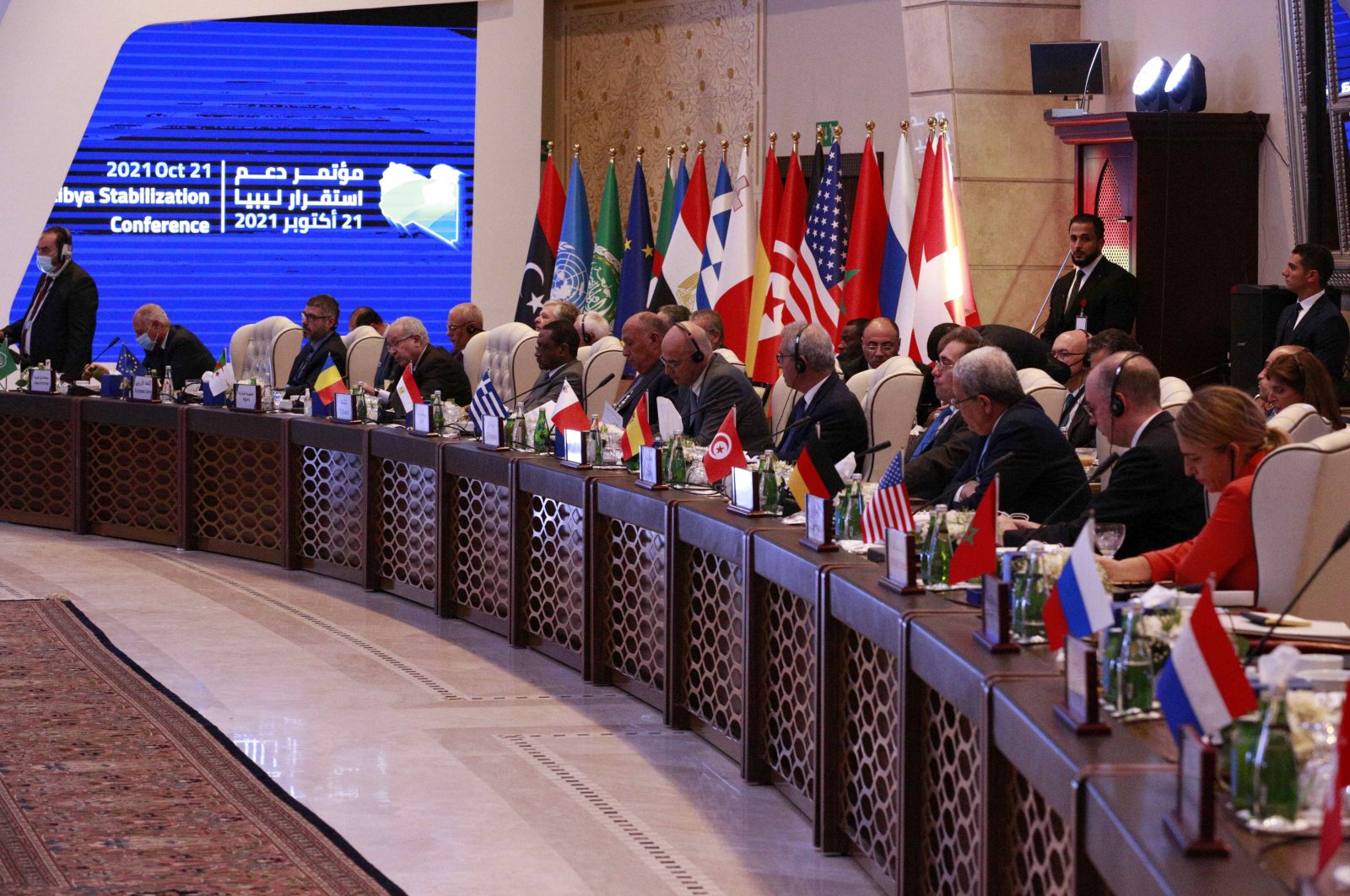- Merkel set for fourth term as chancellor as CDU leads parliamentary vote, exit polls say
- Turkey says it will send back ISIS prisoners even if citizenships revoked
- General Marchenko: ‘Mykolaiv was to be next city to fall, but Russia terribly failed’
- Ukrainian Armed Forces repel enemy attacks in four regions
- Somalia president hails lifting of arms embargo as government vows to wipe out al-Shabab militants
- Captured Somali pirates arrive in India to face trial over ship hijacking
- Stay Connected
Libya hosts conference to gather support ahead of elections

Libyan Prime Minister Abdul Hamid Dbeibah hosts an international conference with western, regional and United Nations representatives aimed at resolving Libya’s thorniest issues ahead of general elections planned for December, at the Corinthia Hotel in Tripoli, Libya, Oct. 21, 2021. (AP Photo)
An international conference began on Thursday in Libya, aiming to drum up support and stability as the war-battered country gears up for a much-anticipated election.
Libya’s parliamentary and presidential elections were originally scheduled to be held on Dec. 24.
But parliament based in eastern Libya delayed the legislative polls until early next year, triggering an objection from the rival High State Council based in the capital Tripoli.
The Libyan rivals are meanwhile divided over constitutional rules, a dispute that has thrown the December vote into uncertainty.
On Thursday, officials from the United Nations, Germany, France, Italy and regional powers including Turkey, Egypt and Saudi Arabia gathered in Tripoli for talks.
Opening the one-day meeting, Libyan Prime Minister Abdul Hamid Dbeibah voiced support for holding the election as scheduled.
“(The conference) underlines our continued support for implementing the elections, providing favorable circumstances for them and encouraging all Libyan sides to respect their results,” he said.
The talks also seek to find common ground on other issues including the withdrawal of foreign forces and mercenaries from Libya.
“There is no stability without full national sovereignty,” said Libyan Foreign Minister Najla Mangoush.
In October last year, Libya’s warring sides reached a country-wide permanent cease-fire agreement and set a three-month deadline for withdrawal of foreign troops and mercenaries.
However, thousands of such fighters remain in Libya.
Last December, the U.N. estimated that 20,000 foreign fighters were present in Libya.
They include Russians sent by the shadowy Kremlin-linked Wagner group, African and Syrian mercenaries and Turkish soldiers deployed under a deal with a previous official unity government at the height of the last round of east-west fighting.
Earlier this month, representatives of Libya’s warring sides agreed in Geneva to begin the process of withdrawing all mercenaries and foreign fighters from the country.
An action plan foresees this withdrawal “in a phased, balanced and synchronized manner,” the U.N. said.
The U.N. Under-Secretary-General for Political Affairs, Rosemary DiCarlo, insisted on the importance of the December elections to “complete the transitional phase.”
She called on international organizations to send “special envoys to observe this operation” and guarantee its transparency.
The meeting aims to “gather the necessary support, in a transparent way” for the vote, said Mangoush in a video published by her ministry on Sunday.
Also on the list of Libya’s woes is the question of integrating and unifying the country’s armed forces under a single command – forces that as recently as last year were firing at each other.
And while in theory the country has a unity government, its east is largely controlled by putschist Gen. Khalifa Haftar, widely expected to stand as a presidential candidate but despised by many in Libya’s west.
Source:dailysabah.com/world/africa
All News
- Iran vows to react ‘within seconds’ to each new mistake made by Israel
- State Emergency Service: Russian missile attack on Chernihiv kills at least 17, injures 60, including children
- Erdoğan vows to defend Palestinian cause against all odds
- ‘Major escalation’: EU leaders rally against Iran’s attack on Israel
- Iran warns Israel of severe consequences after retaliatory attack
- Kenya proposes maritime treaty to defuse Ethiopia-Somalia tensions
- Gaza death toll hits 33,634 as Israel kills 89 more Palestinians
- Israel on alert after Iranian threat as Gaza war rages on
- EU countries not enforcing migration pact could face legal action, says Johansson
- UN body mulls Israel arms embargo resolution as Gaza toll hits 33K
- Home
- Merkel set for fourth term as chancellor as CDU leads parliamentary vote, exit polls say
- Turkey says it will send back ISIS prisoners even if citizenships revoked
- General Marchenko: ‘Mykolaiv was to be next city to fall, but Russia terribly failed’
- Ukrainian Armed Forces repel enemy attacks in four regions
- Somalia president hails lifting of arms embargo as government vows to wipe out al-Shabab militants
- Captured Somali pirates arrive in India to face trial over ship hijacking
- RSS
Contact@kasmaal.com